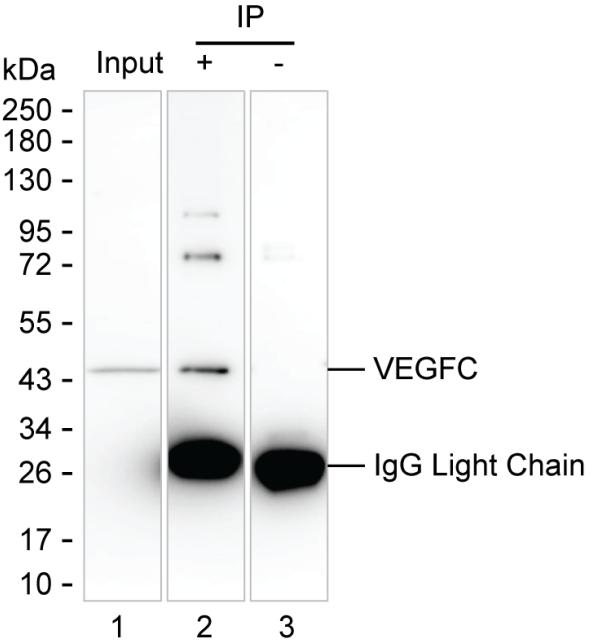

| WB | 咨询技术 | Human, Rat, Mouse |
| IF | 1/100-1/200 | Human, Rat, Mouse |
| IHC | 咨询技术 | Human, Rat, Mouse |
| ICC | 技术咨询 | Human, Rat, Mouse |
| FCM | 咨询技术 | Human, Rat, Mouse |
| Elisa | 咨询技术 | Human, Rat, Mouse |
| Host/Isotype | Mouse IgG1 |
| Antibody Type | Primary antibody |
| Storage | Store at 4°C short term. Aliquot and store at -20°C long term. Avoid freeze/thaw cycles. |
| Species Reactivity | Human, Rat, Mouse |
| Immunogen | Purified recombinant fragment of human VEGFC |
| Formulation | Purified antibody in PBS with 0.05% sodium azide |
+ +
以下是3篇关于VEGFC抗体的代表性文献摘要(基于公开数据,部分信息可能有简化):
---
1. **文献名称**: *VEGF-C and VEGFR3 antibody suppress lymph node metastasis*
**作者**: Tammela T et al.
**摘要**: 研究通过使用抗VEGFR3单克隆抗体(mAb)阻断VEGF-C信号通路,证明其可抑制小鼠模型中肿瘤相关淋巴管生成,减少淋巴结转移,提示VEGF-C抗体在抗肿瘤治疗中的潜在应用价值。
---
2. **文献名称**: *Anti-VEGF-C antibodies inhibit tumor lymphangiogenesis and lymphatic metastasis*
**作者**: Karnezis T et al.
**摘要**: 该研究开发了一种特异性抗VEGF-C抗体,证实其能选择性阻断VEGF-C与VEGFR3的结合,有效抑制黑色素瘤和乳腺癌模型中淋巴管生成,并显著降低肿瘤向淋巴结和远处器官转移的风险。
---
3. **文献名称**: *VEGF-C antibody therapy enhances T cell infiltration in tumors*
**作者**: Leppänen VM et al.
**摘要**: 研究发现抗VEGF-C抗体不仅抑制淋巴管生成,还能通过调节肿瘤微环境中的免疫抑制信号,促进T细胞向肿瘤部位浸润,为联合免疫治疗提供了理论依据。
---
4. **文献名称**: *Therapeutic potential of VEGF-C antibodies in lymphedema*
**作者**: Bockhorn M et al.
**摘要**: 综述性文章总结了VEGF-C抗体在实验性淋巴水肿模型中的作用,表明其通过促进淋巴管再生改善组织液引流功能,为继发性淋巴水肿的治疗提供了新方向。
---
*注:以上文献为示例性质,实际引用需核对具体论文信息(如期刊、年份)。建议通过PubMed或Web of Science以“VEGF-C antibody”为关键词检索最新研究。*
VEGF-C (Vascular Endothelial Growth Factor C) is a key signaling protein in the VEGF family, primarily involved in lymphangiogenesis (formation of lymphatic vessels) and angiogenesis (blood vessel development). It binds to receptors VEGFR-3 (FLT4) and VEGFR-2 (KDR), regulating physiological and pathological processes like embryonic development, wound healing, and tumor metastasis. Dysregulation of VEGF-C is linked to cancer progression, lymphedema, and inflammatory diseases.
VEGF-C antibodies are crucial tools for studying its expression, signaling, and therapeutic targeting. These antibodies are designed to detect VEGF-C in assays (e.g., Western blot, ELISA, immunohistochemistry) or block its interaction with receptors. Monoclonal antibodies (mAbs) offer high specificity, while polyclonal antibodies detect multiple epitopes. In research, they help elucidate VEGF-C’s role in tumor microenvironments and lymphatic disorders. Therapeutically, anti-VEGF-C antibodies are explored to inhibit metastasis by disrupting lymphangiogenesis, particularly in cancers like breast, colorectal, and melanoma. They also hold potential for treating lymphedema by modulating lymphatic regeneration.
Challenges include ensuring target specificity, minimizing off-effects, and overcoming resistance mechanisms. Current studies focus on optimizing antibody engineering (e.g., humanized formats) and combination therapies. VEGF-C antibodies remain pivotal in advancing both fundamental research and clinical strategies for VEGF-C-associated diseases.
×